
MCPSpy
MCP Monitoring with eBPF
Stars: 403
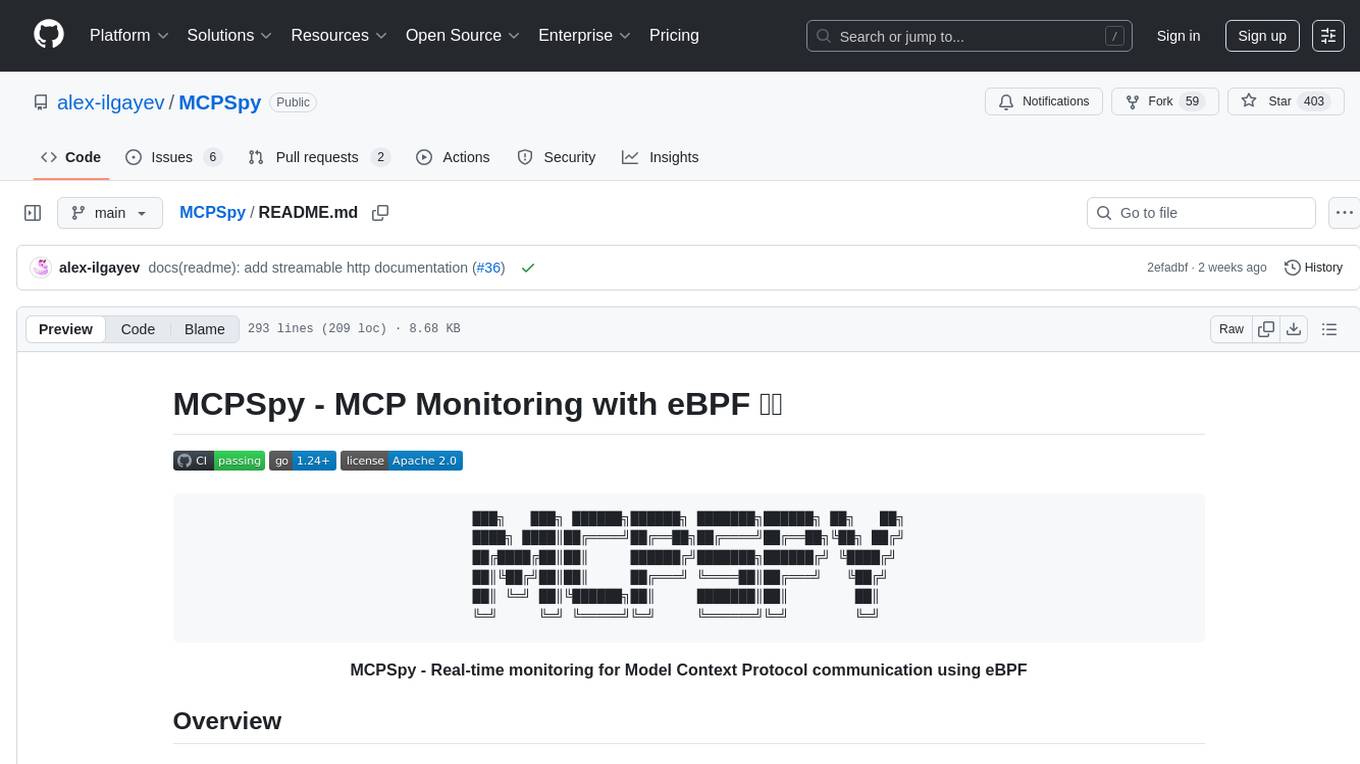
MCPSpy is a command-line tool leveraging eBPF technology to monitor Model Context Protocol (MCP) communication at the kernel level. It provides real-time visibility into JSON-RPC 2.0 messages exchanged between MCP clients and servers, supporting Stdio and HTTP transports. MCPSpy offers security analysis, debugging, performance monitoring, compliance assurance, and learning opportunities for understanding MCP communications. The tool consists of eBPF programs, an eBPF loader, an HTTP session manager, an MCP protocol parser, and output handlers for console display and JSONL output.
README:
███╗ ███╗ ██████╗██████╗ ███████╗██████╗ ██╗ ██╗ ████╗ ████║██╔════╝██╔══██╗██╔════╝██╔══██╗╚██╗ ██╔╝ ██╔████╔██║██║ ██████╔╝███████╗██████╔╝ ╚████╔╝ ██║╚██╔╝██║██║ ██╔═══╝ ╚════██║██╔═══╝ ╚██╔╝ ██║ ╚═╝ ██║╚██████╗██║ ███████║██║ ██║ ╚═╝ ╚═╝ ╚═════╝╚═╝ ╚══════╝╚═╝ ╚═╝MCPSpy - Real-time monitoring for Model Context Protocol communication using eBPF
MCPSpy is a powerful command-line tool that leverages eBPF (Extended Berkeley Packet Filter) technology to monitor Model Context Protocol (MCP) communication at the kernel level. It provides real-time visibility into JSON-RPC 2.0 messages exchanged between MCP clients and servers by hooking into low-level system calls.
The Model Context Protocol supports three transport protocols for communication:
- Stdio: Communication over standard input/output streams
- Streamable HTTP: Direct HTTP request/response communication with server-sent events
- SSE (Server-Sent Events): HTTP-based streaming communication (Deprecated)
MCPSpy supports monitoring of both Stdio and HTTP/HTTPS transports (including Server-Sent Events), providing comprehensive coverage of MCP communication channels.
The Model Context Protocol is becoming the standard for AI tool integration, but understanding what's happening under the hood can be challenging. MCPSpy addresses this by providing:
- 🔒 Security Analysis: Monitor what data is being transmitted, detect PII leakage, and audit tool executions
- 🐛 Debugging: Troubleshoot MCP integrations by seeing the actual message flow
- 📊 Performance Monitoring: Track message patterns and identify bottlenecks
- 🔍 Compliance: Ensure MCP communications meet regulatory requirements
- 🎓 Learning: Understand how MCP works by observing real communications
- Linux kernel version 5.15 or later
- Root privileges (required for eBPF)
Download the latest release from the releases page:
# Set platform-aware binary name
BIN="mcpspy-$(uname -s | tr '[:upper:]' '[:lower:]')-$(uname -m | sed -e 's/x86_64/amd64/' -e 's/aarch64/arm64/')"
# Download the correct binary
wget "https://github.com/alex-ilgayev/mcpspy/releases/latest/download/${BIN}"
# Make it executable and move to a directory in your PATH
chmod +x "${BIN}"
sudo mv "${BIN}" /usr/local/bin/mcpspy✅ Note: Currently supported platforms: linux-amd64, linux-arm64
First, install the required system dependencies:
sudo apt-get update
# Install build essentials, eBPF dependencies
sudo apt-get install -y clang clang-format llvm make libbpf-dev build-essential
# Install Python 3 and pip (for e2e tests)
sudo apt-get install -y python3 python3-pip python3-venv
# Install docker and buildx (if not already installed)
sudo apt-get install -y docker.io docker-buildxMCPSpy requires Go 1.24 or later. Install Go using one of these methods:
Option 1: Install from the official Go website (Recommended)
# Download and install Go 1.24.1 (adjust version as needed)
wget https://go.dev/dl/go1.24.1.linux-amd64.tar.gz
sudo rm -rf /usr/local/go
sudo tar -C /usr/local -xzf go1.24.1.linux-amd64.tar.gz
# Add Go to PATH (add this to your ~/.bashrc or ~/.profile for persistence)
export PATH=$PATH:/usr/local/go/binOption 2: Install via snap
sudo snap install go --classicClone the repository and build MCPSpy:
# Clone the repository
git clone https://github.com/alex-ilgayev/mcpspy.git
cd mcpspy
# Build the project
make all# Build Docker image
make image
# Or pull the latest image
docker pull ghcr.io/alex-ilgayev/mcpspy:latest
# Or pull a specific image release
docker pull ghcr.io/alex-ilgayev/mcpspy:v0.1.0
# Run the container
docker run --rm -it --privileged ghcr.io/alex-ilgayev/mcpspy:latest# Start monitoring MCP communication
sudo mcpspy
# Start monitoring with raw message buffers
sudo mcpspy -b
# Start monitoring and save output to JSONL file
sudo mcpspy -o output.jsonl
# Stop monitoring with Ctrl+C
12:34:56.789 python[12345] → python[12346] REQ tools/call (get_weather) Execute a tool
12:34:56.890 python[12346] → python[12345] RESP OK
{
"timestamp": "2024-01-15T12:34:56.789Z",
"transport_type": "stdio",
"stdio_transport": {
"from_pid": 12345,
"from_comm": "python",
"to_pid": 12346,
"to_comm": "python"
},
"type": "request",
"id": 7,
"method": "tools/call",
"params": {
"name": "get_weather",
"arguments": { "city": "New York" }
},
"raw": "{...}"
}For HTTP/HTTPS transport:
{
"timestamp": "2024-01-15T12:34:56.789Z",
"transport_type": "http",
"type": "request",
"id": 7,
"method": "tools/call",
"params": {
"name": "get_weather",
"arguments": { "city": "New York" }
},
"raw": "{...}"
}MCPSpy consists of several components:
- Hooks into
vfs_readandvfs_writekernel functions for stdio transport - Hooks into TLS library functions (
SSL_read,SSL_write) for HTTP/HTTPS transport - Filters potential MCP traffic by detecting JSON patterns
- Sends events to userspace via ring buffer
- Minimal performance impact with early filtering
- Manages the lifecycle of eBPF programs and resources
- Loads pre-compiled eBPF objects into the kernel using cilium/ebpf library
- Converts raw binary events from kernel space into structured Go data types
- Manages HTTP/HTTPS sessions and correlates request/response pairs
- Handles TLS payload interception and parsing
- Supports chunked transfer encoding and Server-Sent Events (SSE)
- Reconstructs complete HTTP messages from fragmented TLS data
- Validates JSON-RPC 2.0 message format
- Parses MCP-specific methods and parameters
- Correlates read operations and write operations into a single MCP message (relevant for stdio transport)
- Supports both stdio and HTTP/HTTPS transports (including SSE)
- Console display with colored, formatted output
- JSONL output for programmatic analysis
- Real-time statistics tracking
# Generate eBPF bindings and build
make all
# Build Docker image
make imageMCPSpy includes comprehensive end-to-end tests that simulate real MCP communication across different transports:
# (Optional) Set up test environment
make test-e2e-setup
# Run all tests (requires root privileges)
make test-e2e
# Run individual transport tests
make test-e2e-stdio # Test stdio transport
make test-e2e-https # Test HTTP/HTTPS transportThe test suite includes:
- MCP server and client simulators for both stdio and HTTP transports
- Message validation against expected outputs
- Multiple message type coverage
- SSL/TLS encrypted HTTP communication testing
- FS Events Buffer Size: Limited to 16KB per message. This means MCP messages larger than 16KB will be missed / ignored.
- Platform: Linux only (kernel 5.15+).
- Transport: Supports stdio and HTTP/HTTPS transports (including SSE).
We welcome contributions! Feel free to open an issue or a pull request.
- User-mode code (Mainly Go): Apache 2.0 (see LICENSE)
-
eBPF C programs (
bpf/*): GPL-2.0-only (see LICENSE-BPF)
For Tasks:
Click tags to check more tools for each tasksFor Jobs:
Alternative AI tools for MCPSpy
Similar Open Source Tools

MCPSpy
MCPSpy is a command-line tool leveraging eBPF technology to monitor Model Context Protocol (MCP) communication at the kernel level. It provides real-time visibility into JSON-RPC 2.0 messages exchanged between MCP clients and servers, supporting Stdio and HTTP transports. MCPSpy offers security analysis, debugging, performance monitoring, compliance assurance, and learning opportunities for understanding MCP communications. The tool consists of eBPF programs, an eBPF loader, an HTTP session manager, an MCP protocol parser, and output handlers for console display and JSONL output.
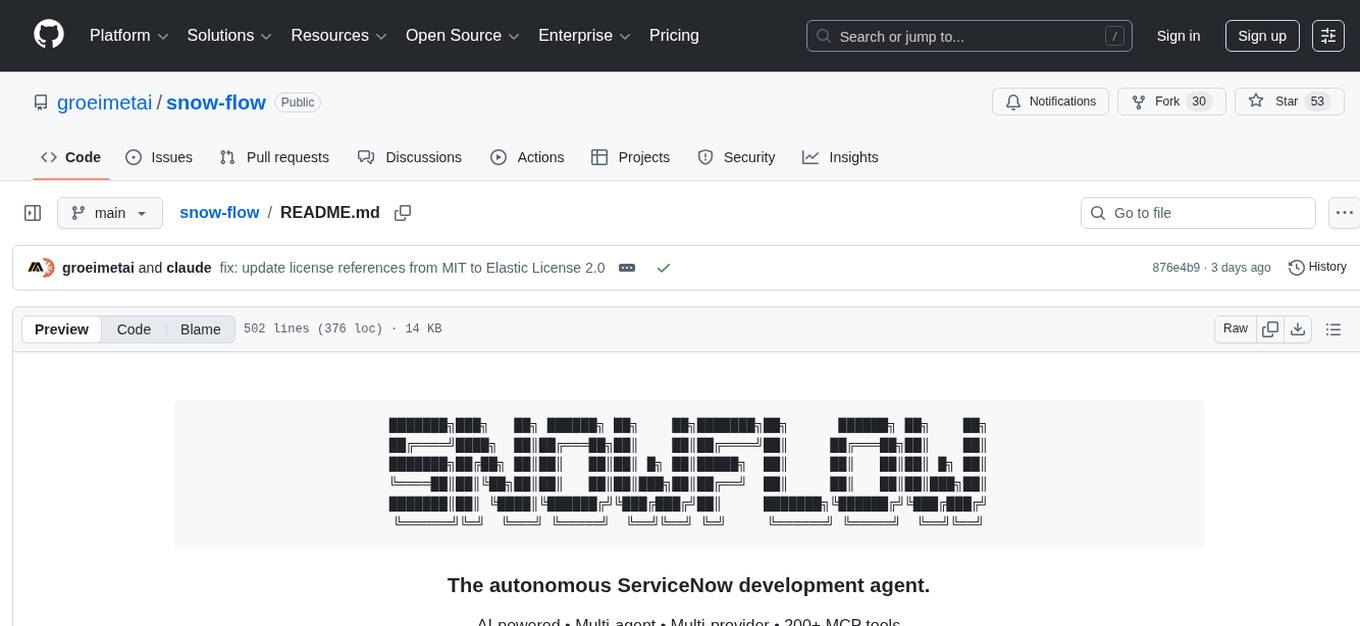
snow-flow
Snow-Flow is an AI-powered, multi-agent development framework designed for ServiceNow. It features a powerful terminal UI with 200+ ServiceNow MCP tools, 54 bundled domain skills, and support for 20+ AI providers. Snow-Flow acts as an autonomous coding agent that understands and interacts with your ServiceNow instance, offering a seamless development experience. It is open-source under the Elastic License 2.0, transparent, and community-driven.
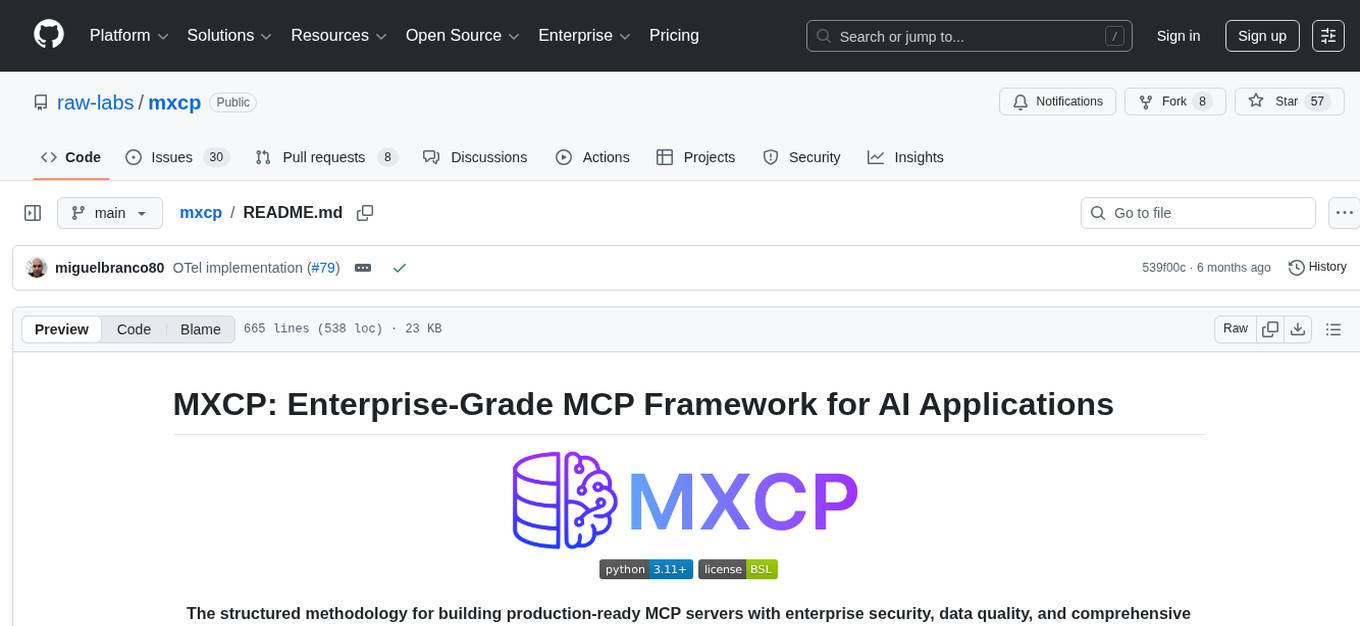
mxcp
MXCP is an enterprise-grade MCP framework for building production-ready AI applications. It provides a structured methodology for data modeling, service design, smart implementation, quality assurance, and production operations. With built-in enterprise features like security, audit trail, type safety, testing framework, performance optimization, and drift detection, MXCP ensures comprehensive security, quality, and operations. The tool supports SQL for data queries and Python for complex logic, ML models, and integrations, allowing users to choose the right tool for each job while maintaining security and governance. MXCP's architecture includes LLM client, MXCP framework, implementations, security & policies, SQL endpoints, Python tools, type system, audit engine, validation & tests, data sources, and APIs. The tool enforces an organized project structure and offers CLI commands for initialization, quality assurance, data management, operations & monitoring, and LLM integration. MXCP is compatible with Claude Desktop, OpenAI-compatible tools, and custom integrations through the Model Context Protocol (MCP) specification. The tool is developed by RAW Labs for production data-to-AI workflows and is released under the Business Source License 1.1 (BSL), with commercial licensing required for certain production scenarios.

Archon
Archon is an AI meta-agent designed to autonomously build, refine, and optimize other AI agents. It serves as a practical tool for developers and an educational framework showcasing the evolution of agentic systems. Through iterative development, Archon demonstrates the power of planning, feedback loops, and domain-specific knowledge in creating robust AI agents.
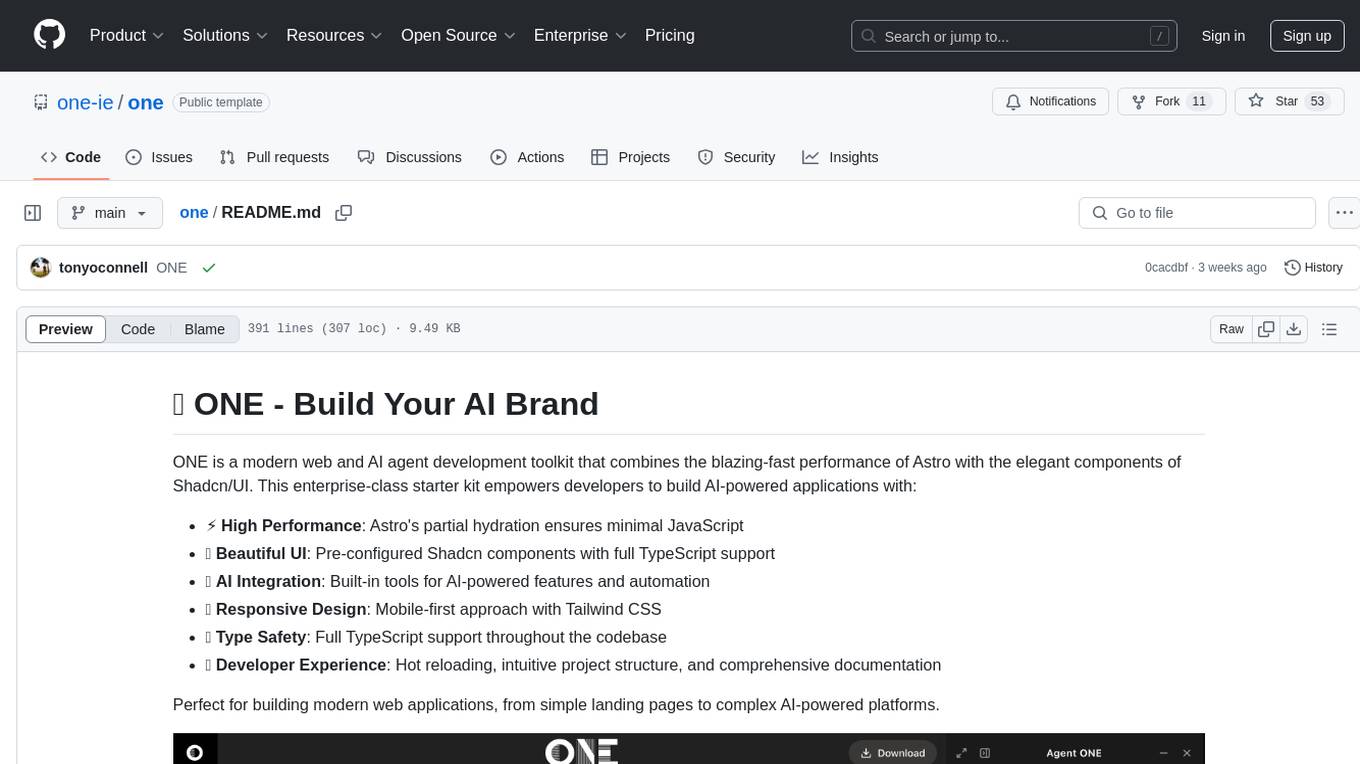
one
ONE is a modern web and AI agent development toolkit that empowers developers to build AI-powered applications with high performance, beautiful UI, AI integration, responsive design, type safety, and great developer experience. It is perfect for building modern web applications, from simple landing pages to complex AI-powered platforms.
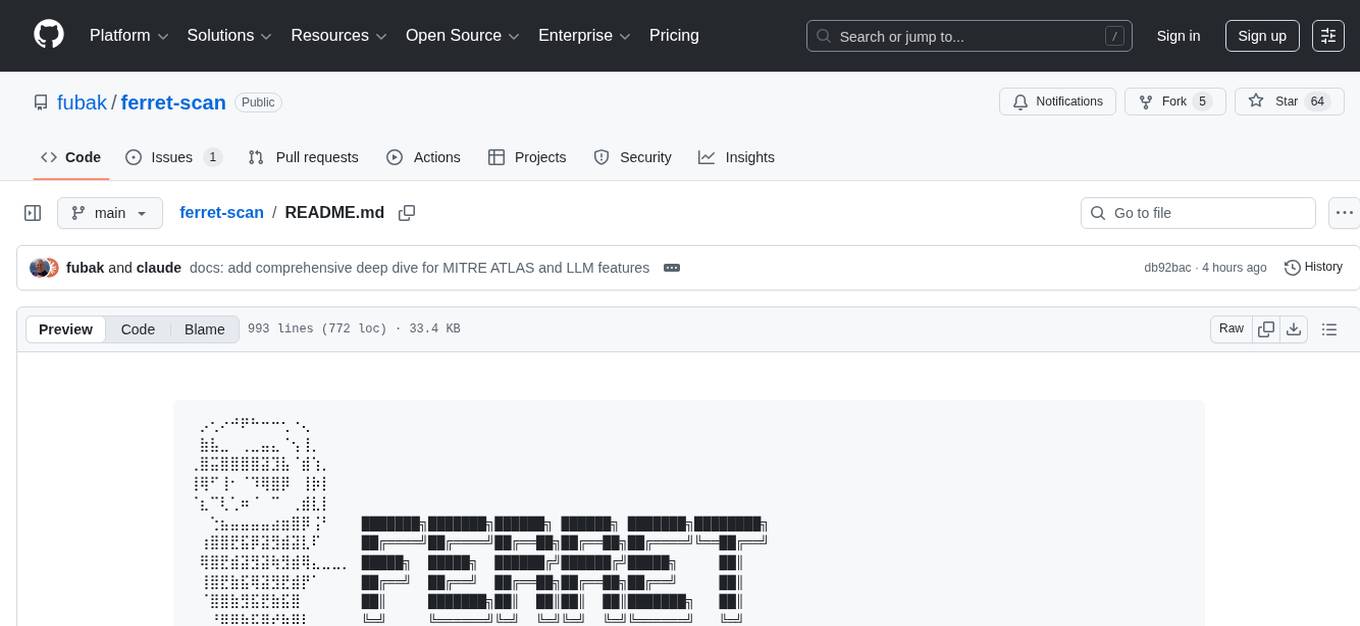
ferret-scan
Ferret is a security scanner designed for AI assistant configurations. It detects prompt injections, credential leaks, jailbreak attempts, and malicious patterns in AI CLI setups. The tool aims to prevent security issues by identifying threats specific to AI CLI structures that generic scanners might miss. Ferret uses threat intelligence with a local indicator database by default and offers advanced features like IDE integrations, behavior analysis, marketplace security analysis, AI-powered rules, sandboxing integration, and compliance frameworks assessment. It supports various AI CLIs and provides detailed findings and remediation suggestions for detected issues.
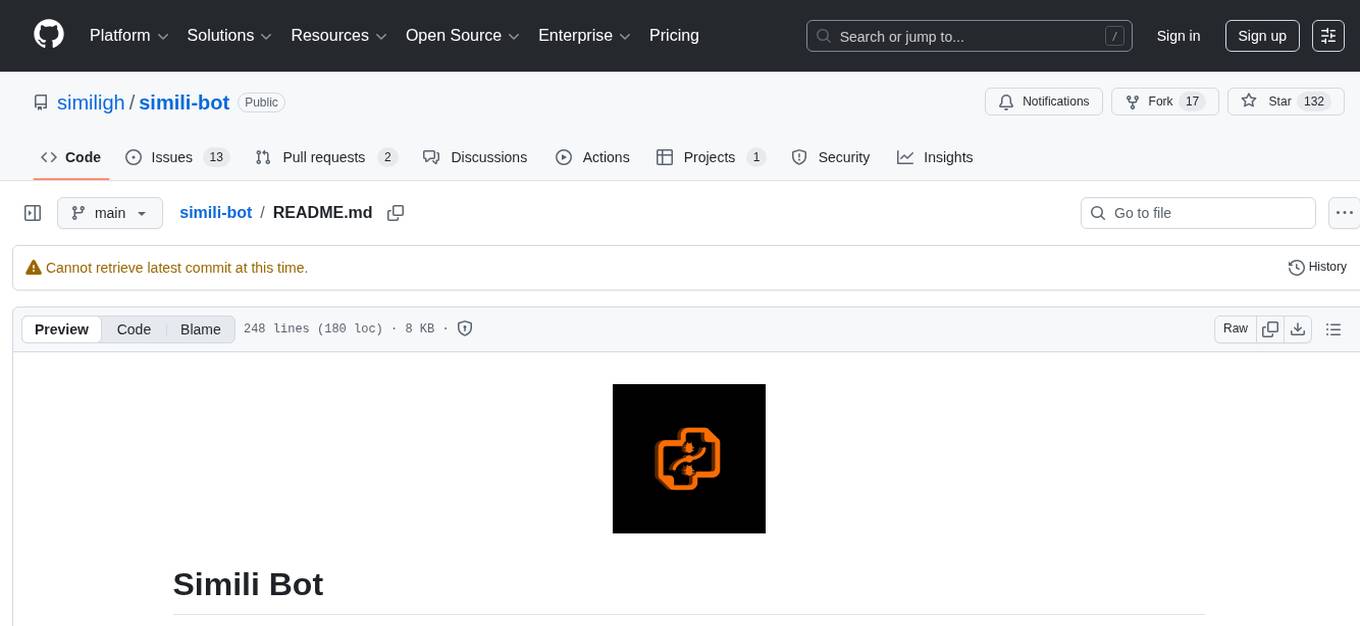
simili-bot
Simili Bot is an AI-powered tool designed for GitHub repositories to automatically detect duplicate issues, find similar issues using semantic search, and intelligently route issues across repositories. It offers features such as semantic duplicate detection, cross-repository search, intelligent routing, smart triage, modular pipeline customization, and multi-repo support. The tool follows a 'Lego with Blueprints' architecture, with Lego Blocks representing independent pipeline steps and Blueprints providing pre-defined workflows. Users can configure AI providers like Gemini and OpenAI, set default models for embeddings, and specify workflows in a 'simili.yaml' file. Simili Bot also offers CLI commands for bulk indexing, processing single issues, and batch operations, enabling local development, testing, and analysis of historical data.
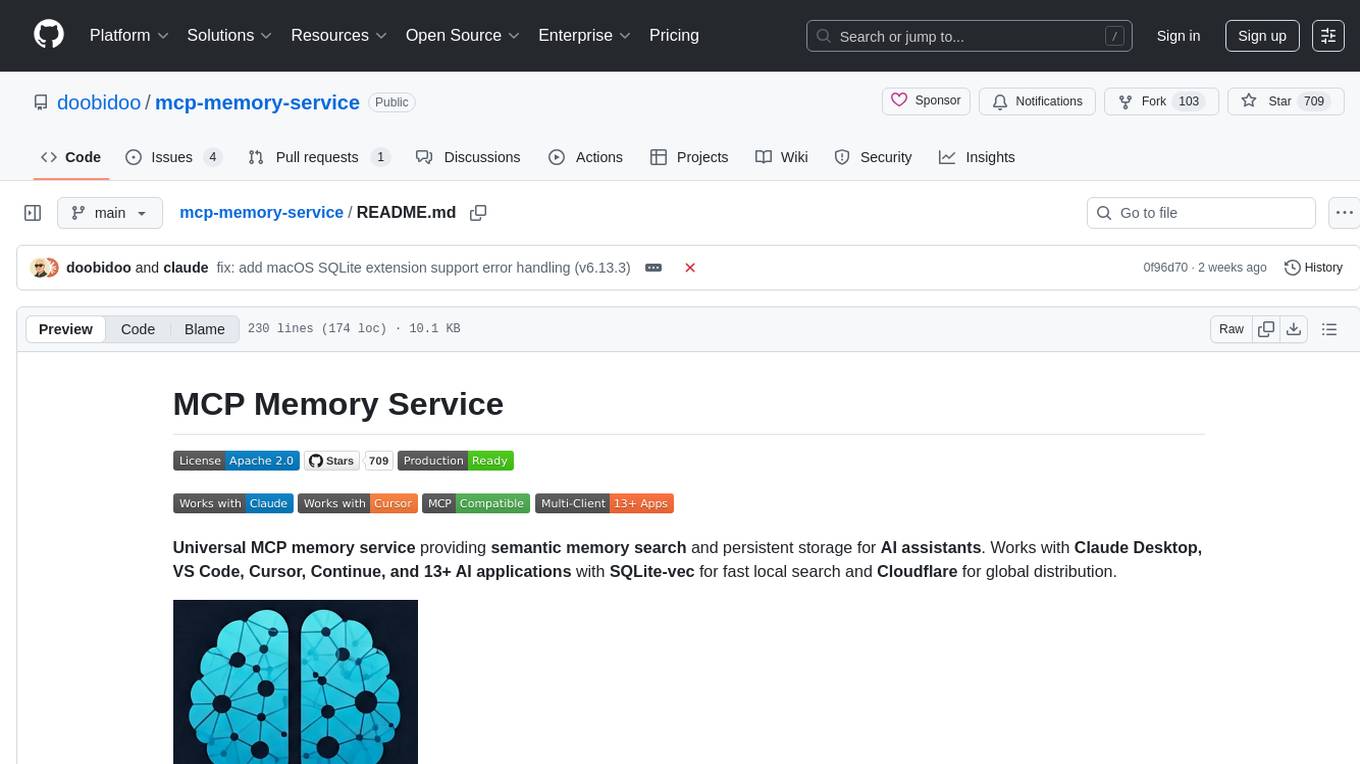
mcp-memory-service
The MCP Memory Service is a universal memory service designed for AI assistants, providing semantic memory search and persistent storage. It works with various AI applications and offers fast local search using SQLite-vec and global distribution through Cloudflare. The service supports intelligent memory management, universal compatibility with AI tools, flexible storage options, and is production-ready with cross-platform support and secure connections. Users can store and recall memories, search by tags, check system health, and configure the service for Claude Desktop integration and environment variables.
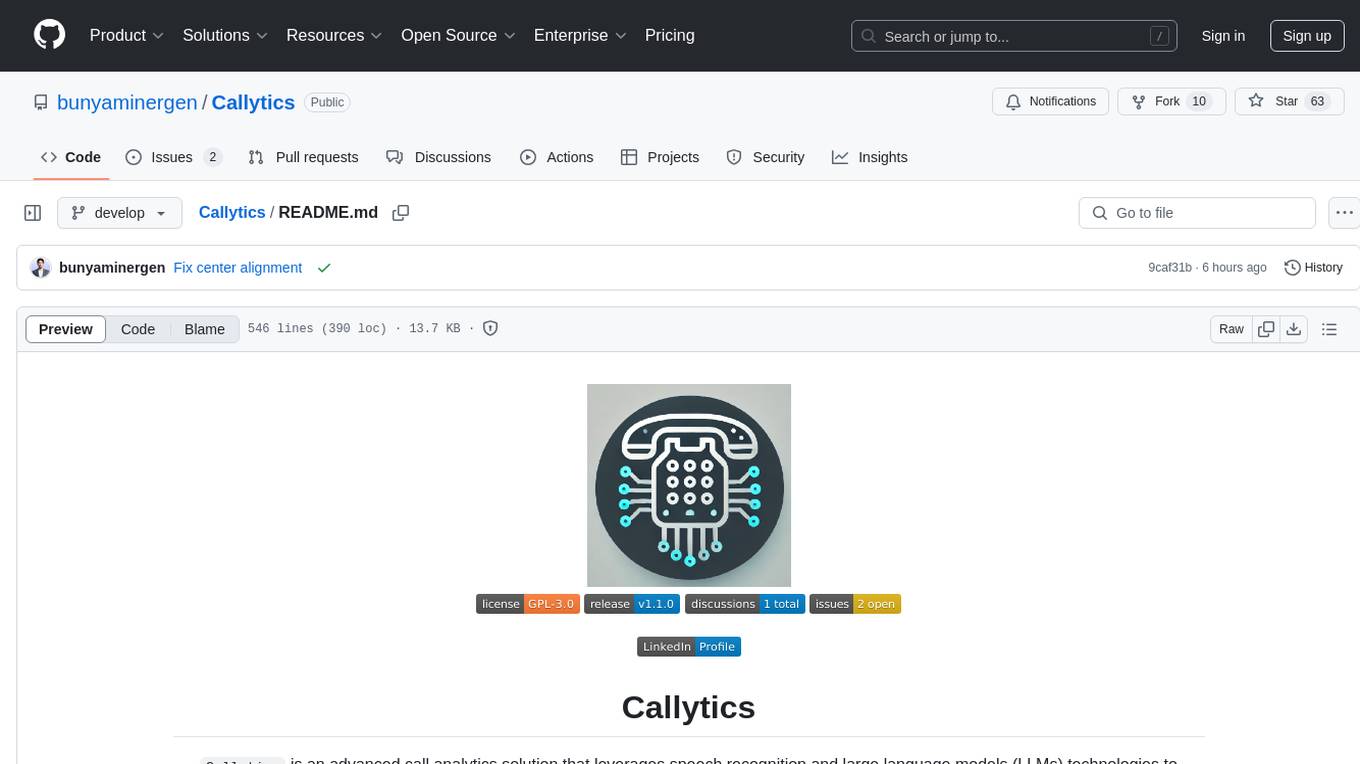
Callytics
Callytics is an advanced call analytics solution that leverages speech recognition and large language models (LLMs) technologies to analyze phone conversations from customer service and call centers. By processing both the audio and text of each call, it provides insights such as sentiment analysis, topic detection, conflict detection, profanity word detection, and summary. These cutting-edge techniques help businesses optimize customer interactions, identify areas for improvement, and enhance overall service quality. When an audio file is placed in the .data/input directory, the entire pipeline automatically starts running, and the resulting data is inserted into the database. This is only a v1.1.0 version; many new features will be added, models will be fine-tuned or trained from scratch, and various optimization efforts will be applied.
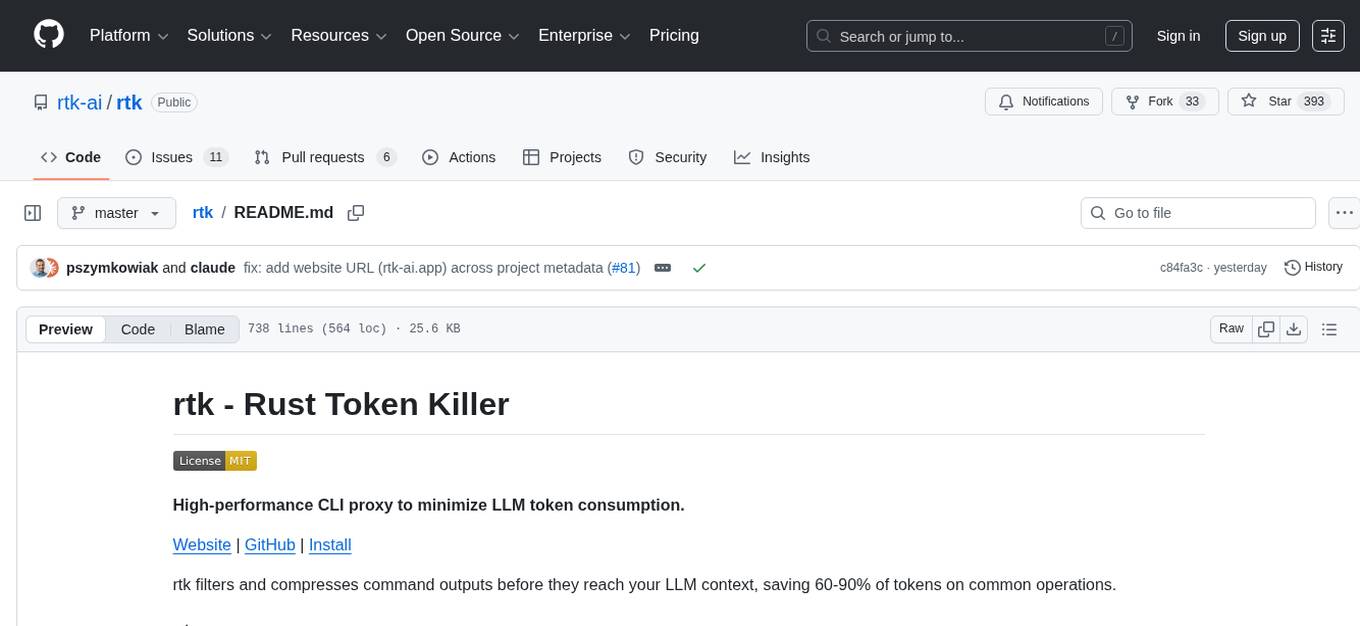
rtk
RTK is a lightweight and flexible tool for real-time kinematic positioning. It provides accurate positioning data by combining data from GPS satellites with a reference station. RTK is commonly used in surveying, agriculture, construction, and drone navigation. The tool offers real-time corrections to improve the accuracy of GPS data, making it ideal for applications requiring precise location information. With RTK, users can achieve centimeter-level accuracy in their positioning data, enabling them to perform tasks that demand high precision and reliability.
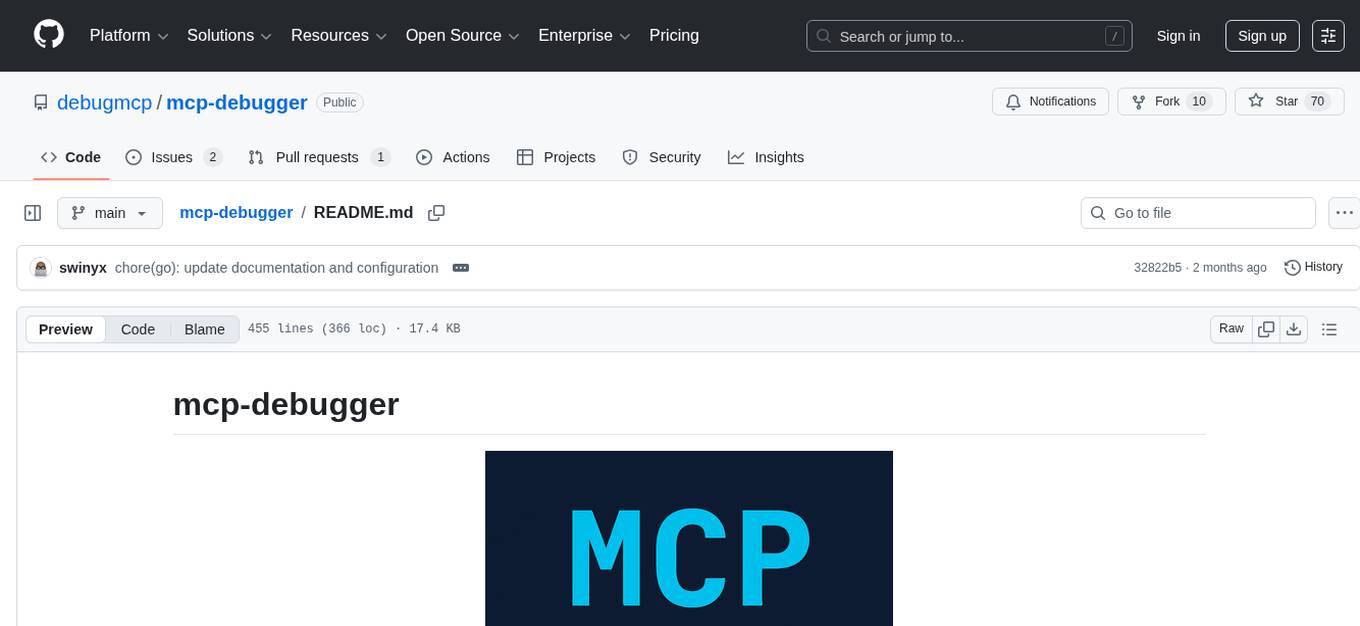
mcp-debugger
mcp-debugger is a Model Context Protocol (MCP) server that provides debugging tools as structured API calls. It enables AI agents to perform step-through debugging of multiple programming languages using the Debug Adapter Protocol (DAP). The tool supports multi-language debugging with clean adapter patterns, including Python debugging via debugpy, JavaScript (Node.js) debugging via js-debug, and Rust debugging via CodeLLDB. It offers features like mock adapter for testing, STDIO and SSE transport modes, zero-runtime dependencies, Docker and npm packages for deployment, structured JSON responses for easy parsing, path validation to prevent crashes, and AI-aware line context for intelligent breakpoint placement with code context.
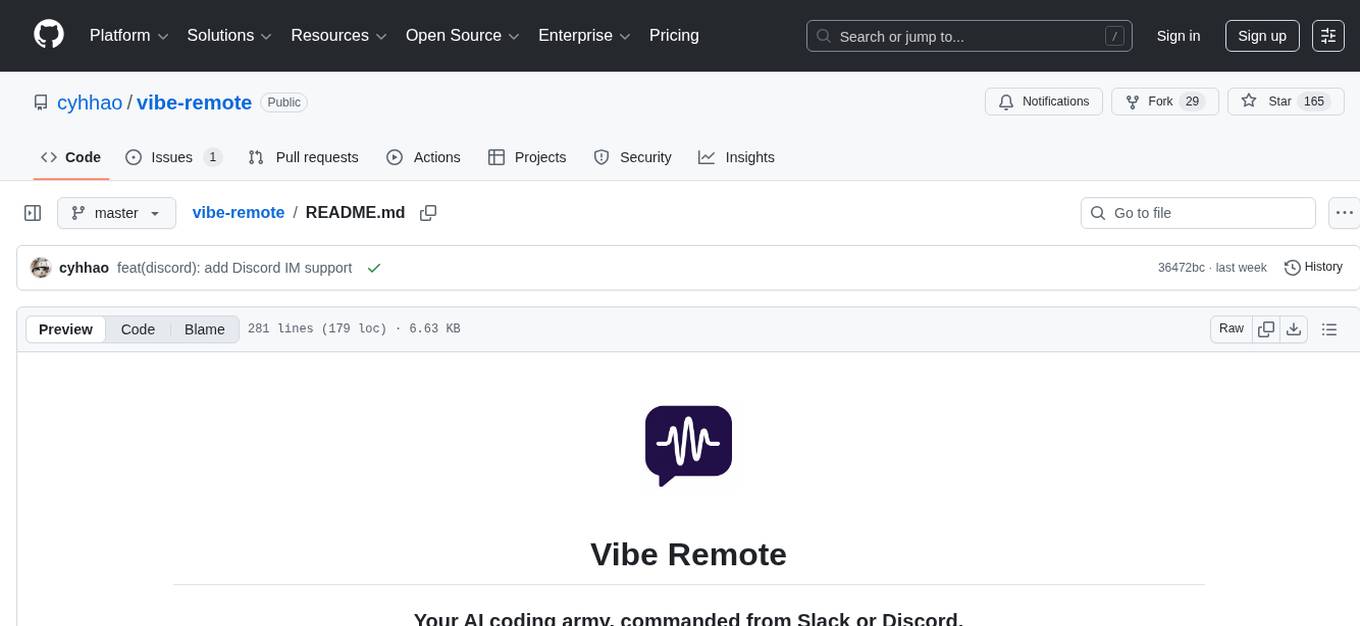
vibe-remote
Vibe Remote is a tool that allows developers to code using AI agents through Slack or Discord, eliminating the need for a laptop or IDE. It provides a seamless experience for coding tasks, enabling users to interact with AI agents in real-time, delegate tasks, and monitor progress. The tool supports multiple coding agents, offers a setup wizard for easy installation, and ensures security by running locally on the user's machine. Vibe Remote enhances productivity by reducing context-switching and enabling parallel task execution within isolated workspaces.
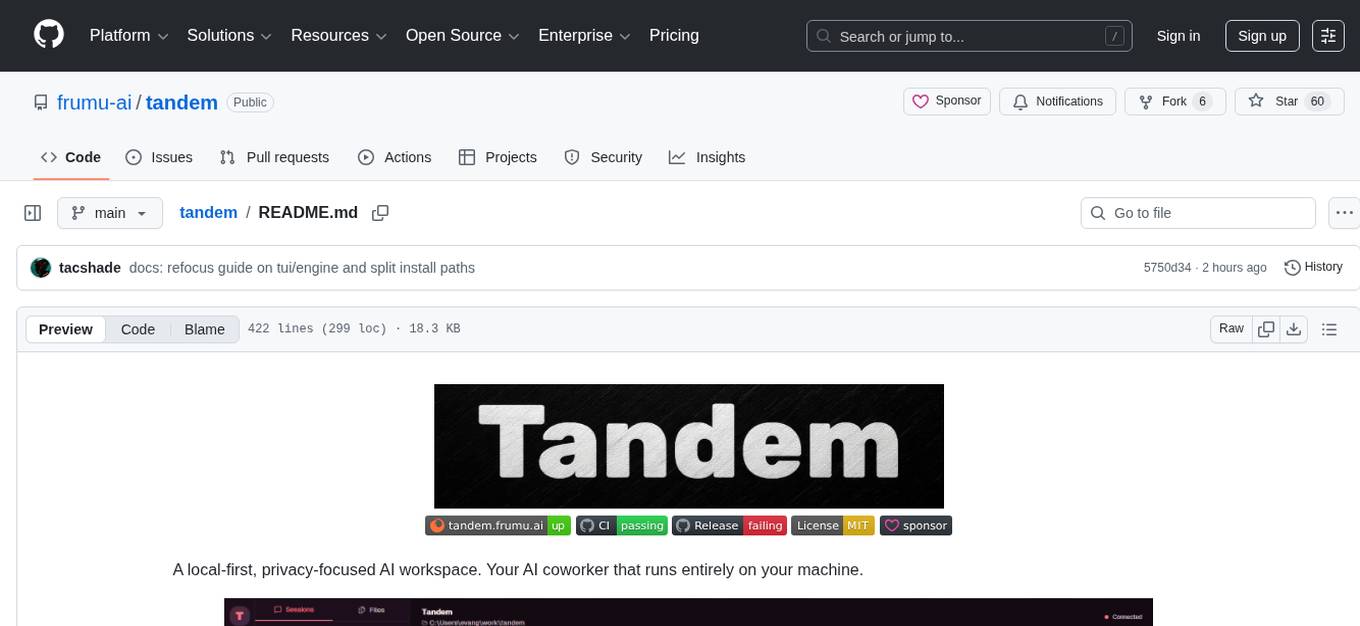
tandem
Tandem is a local-first, privacy-focused AI workspace that runs entirely on your machine. It is inspired by early AI coworking research previews, open source, and provider-agnostic. Tandem offers privacy-first operation, provider agnosticism, zero trust model, true cross-platform support, open-source licensing, modern stack, and developer superpowers for everyone. It provides folder-wide intelligence, multi-step automation, visual change review, complete undo, zero telemetry, provider freedom, secure design, cross-platform support, visual permissions, full undo, long-term memory, skills system, document text extraction, workspace Python venv, rich themes, execution planning, auto-updates, multiple specialized agent modes, multi-agent orchestration, project management, and various artifacts and outputs.
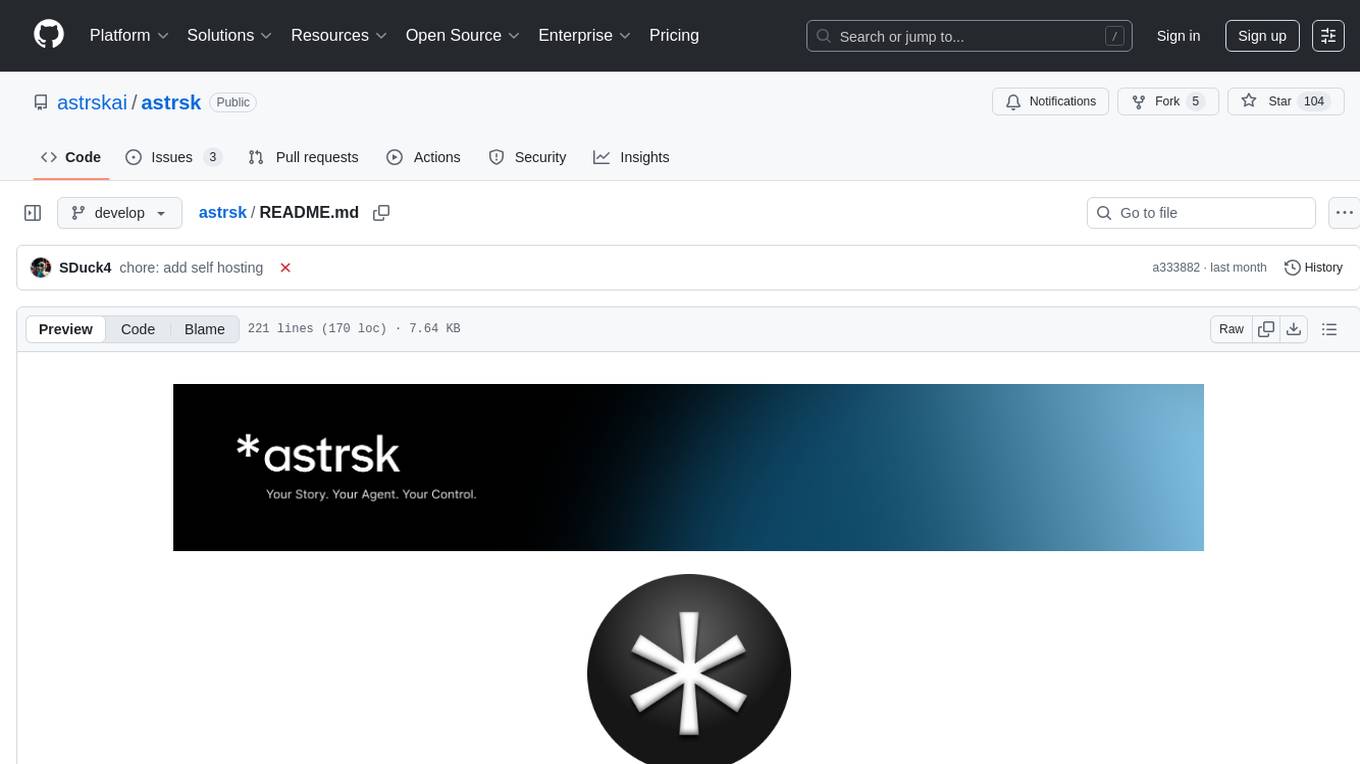
astrsk
astrsk is a tool that pushes the boundaries of AI storytelling by offering advanced AI agents, customizable response formatting, and flexible prompt editing for immersive roleplaying experiences. It provides complete AI agent control, a visual flow editor for conversation flows, and ensures 100% local-first data storage. The tool is true cross-platform with support for various AI providers and modern technologies like React, TypeScript, and Tailwind CSS. Coming soon features include cross-device sync, enhanced session customization, and community features.
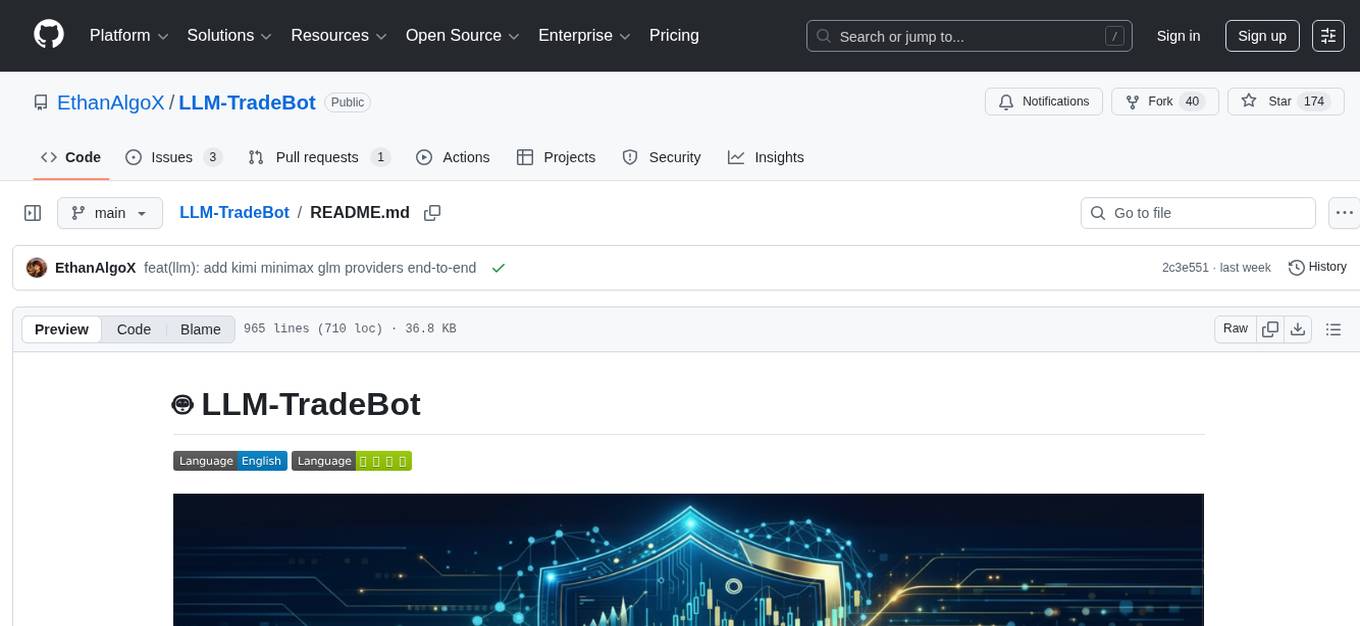
LLM-TradeBot
LLM-TradeBot is an Intelligent Multi-Agent Quantitative Trading Bot based on the Adversarial Decision Framework (ADF). It achieves high win rates and low drawdown in automated futures trading through market regime detection, price position awareness, dynamic score calibration, and multi-layer physical auditing. The bot prioritizes judging 'IF we should trade' before deciding 'HOW to trade' and offers features like multi-agent collaboration, agent configuration, agent chatroom, AUTO1 symbol selection, multi-LLM support, multi-account trading, async concurrency, CLI headless mode, test/live mode toggle, safety mechanisms, and full-link auditing. The system architecture includes a multi-agent architecture with various agents responsible for different tasks, a four-layer strategy filter, and detailed data flow diagrams. The bot also supports backtesting, full-link data auditing, and safety warnings for users.
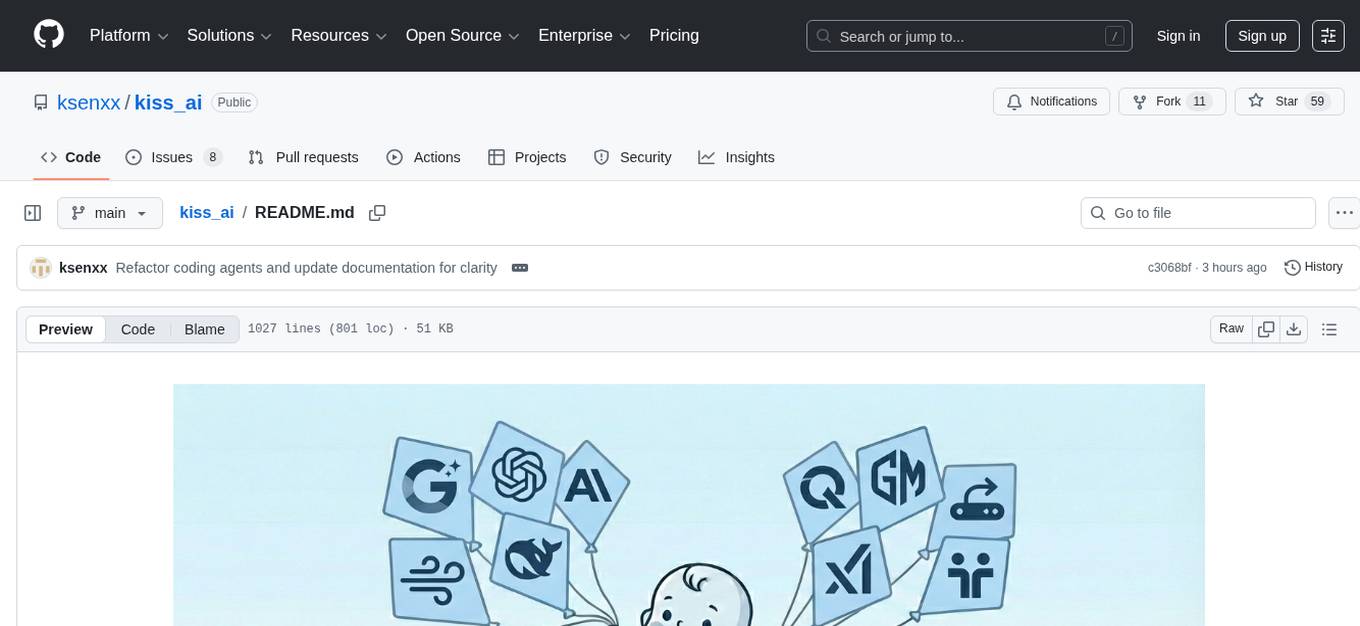
kiss_ai
KISS AI is a lightweight and powerful multi-agent evolutionary framework that simplifies building AI agents. It uses native function calling for efficiency and accuracy, making building AI agents as straightforward as possible. The framework includes features like multi-agent orchestration, agent evolution and optimization, relentless coding agent for long-running tasks, output formatting, trajectory saving and visualization, GEPA for prompt optimization, KISSEvolve for algorithm discovery, self-evolving multi-agent, Docker integration, multiprocessing support, and support for various models from OpenAI, Anthropic, Gemini, Together AI, and OpenRouter.
For similar tasks
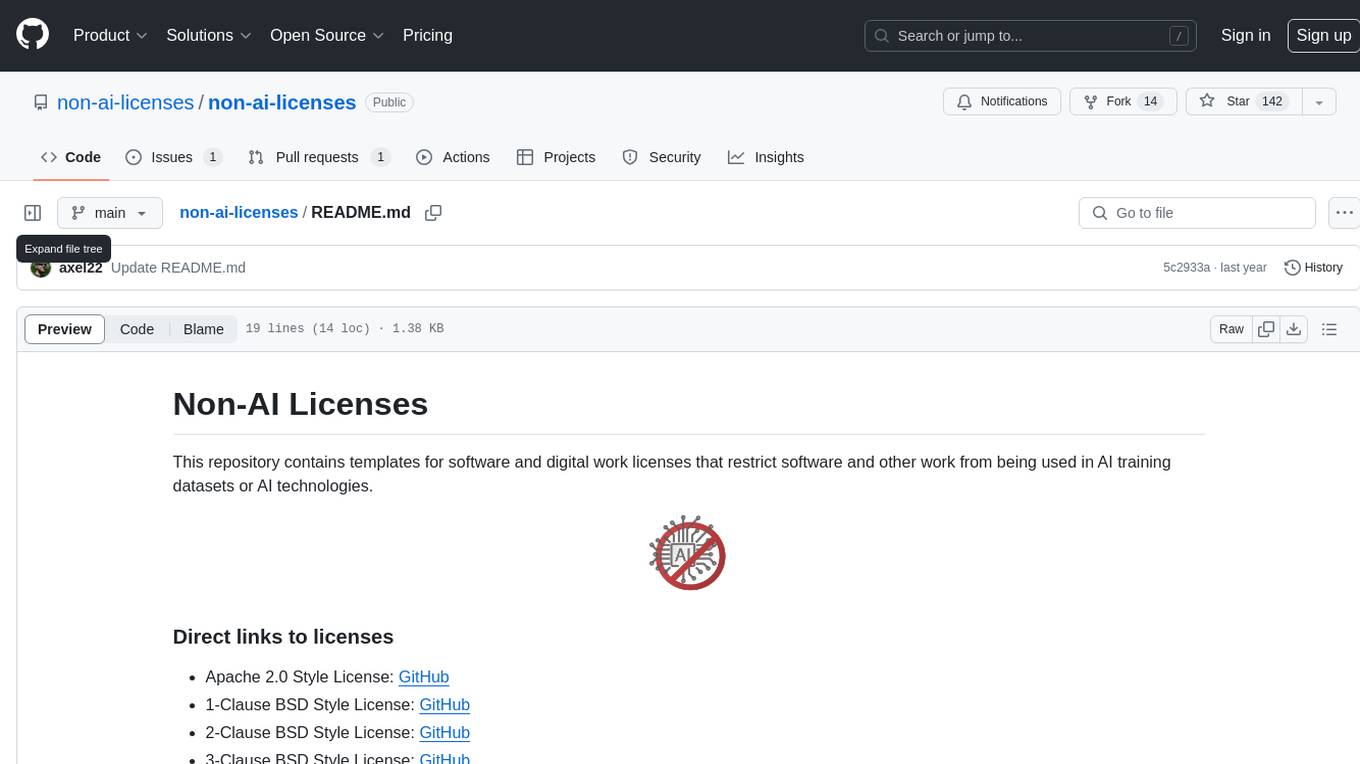
non-ai-licenses
This repository provides templates for software and digital work licenses that restrict usage in AI training datasets or AI technologies. It includes various license styles such as Apache, BSD, MIT, UPL, ISC, CC0, and MPL-2.0.
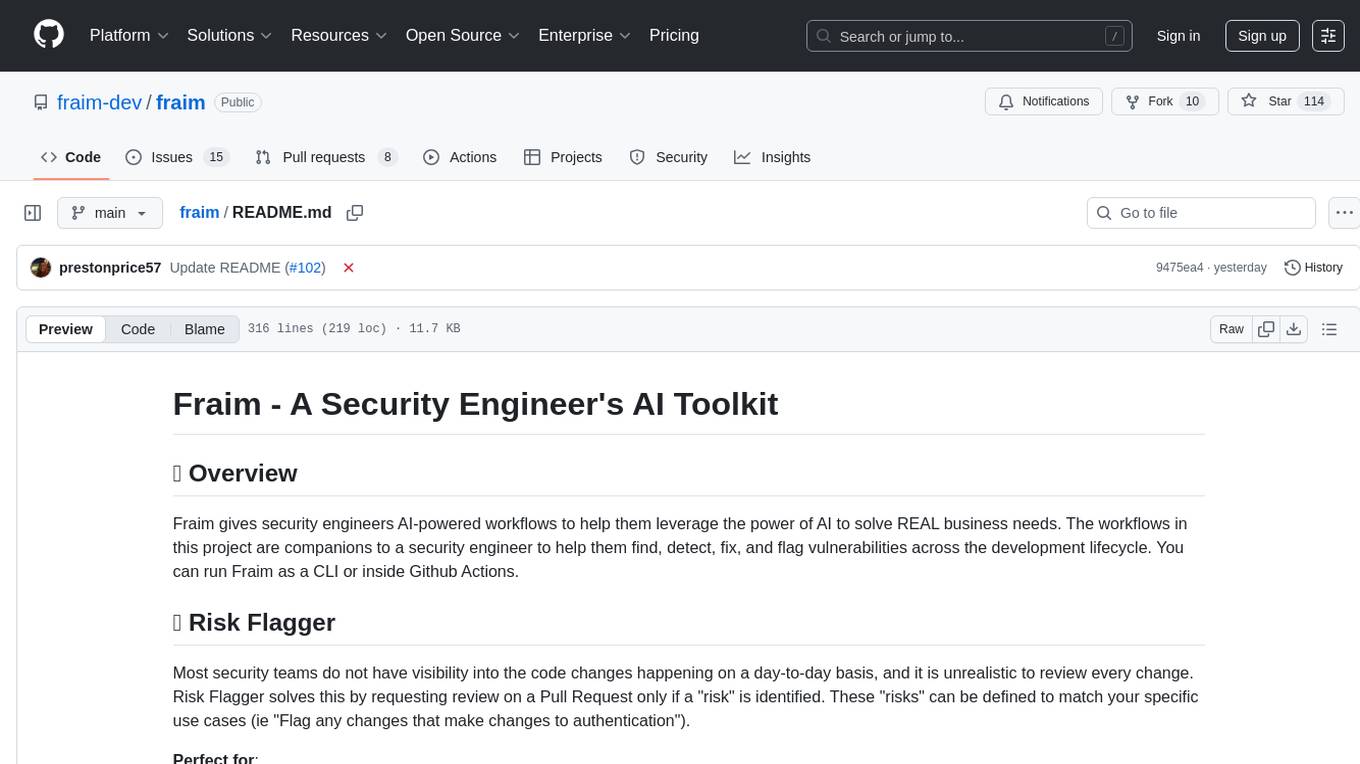
fraim
Fraim is an AI-powered toolkit designed for security engineers to enhance their workflows by leveraging AI capabilities. It offers solutions to find, detect, fix, and flag vulnerabilities throughout the development lifecycle. The toolkit includes features like Risk Flagger for identifying risks in code changes, Code Security Analysis for context-aware vulnerability detection, and Infrastructure as Code Analysis for spotting misconfigurations in cloud environments. Fraim can be run as a CLI tool or integrated into Github Actions, making it a versatile solution for security teams and organizations looking to enhance their security practices with AI technology.

MCPSpy
MCPSpy is a command-line tool leveraging eBPF technology to monitor Model Context Protocol (MCP) communication at the kernel level. It provides real-time visibility into JSON-RPC 2.0 messages exchanged between MCP clients and servers, supporting Stdio and HTTP transports. MCPSpy offers security analysis, debugging, performance monitoring, compliance assurance, and learning opportunities for understanding MCP communications. The tool consists of eBPF programs, an eBPF loader, an HTTP session manager, an MCP protocol parser, and output handlers for console display and JSONL output.
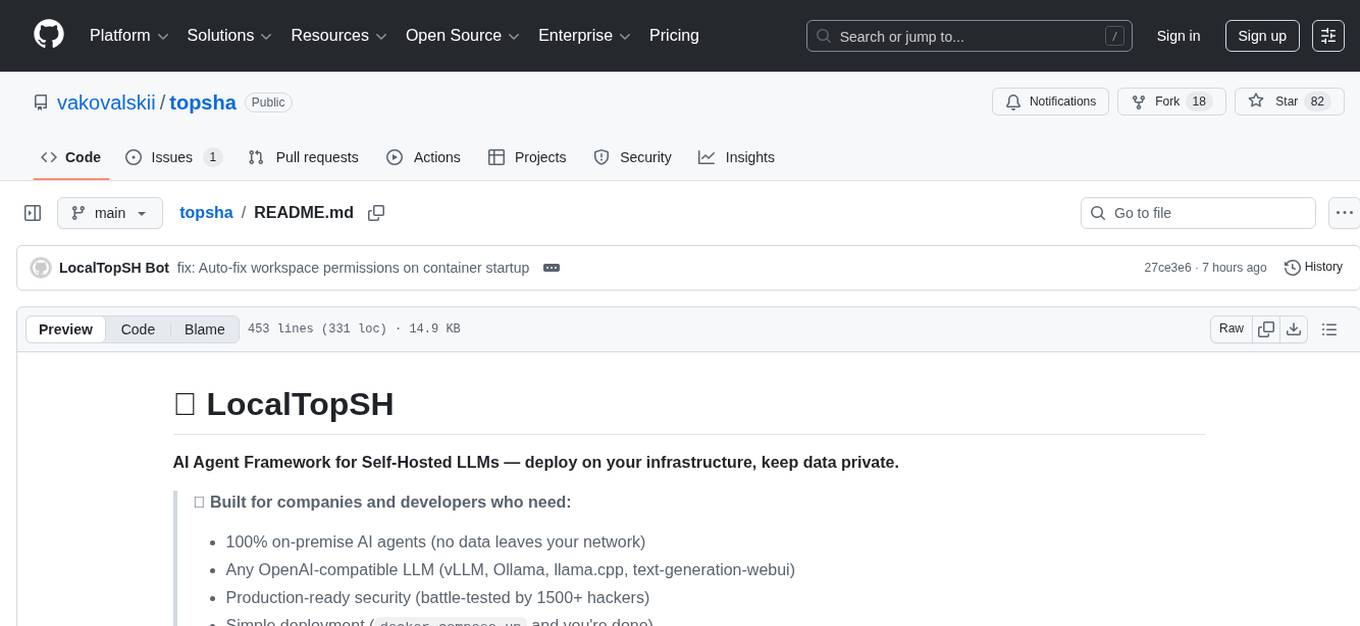
topsha
LocalTopSH is an AI Agent Framework designed for companies and developers who require 100% on-premise AI agents with data privacy. It supports various OpenAI-compatible LLM backends and offers production-ready security features. The framework allows simple deployment using Docker compose and ensures that data stays within the user's network, providing full control and compliance. With cost-effective scaling options and compatibility in regions with restrictions, LocalTopSH is a versatile solution for deploying AI agents on self-hosted infrastructure.
For similar jobs
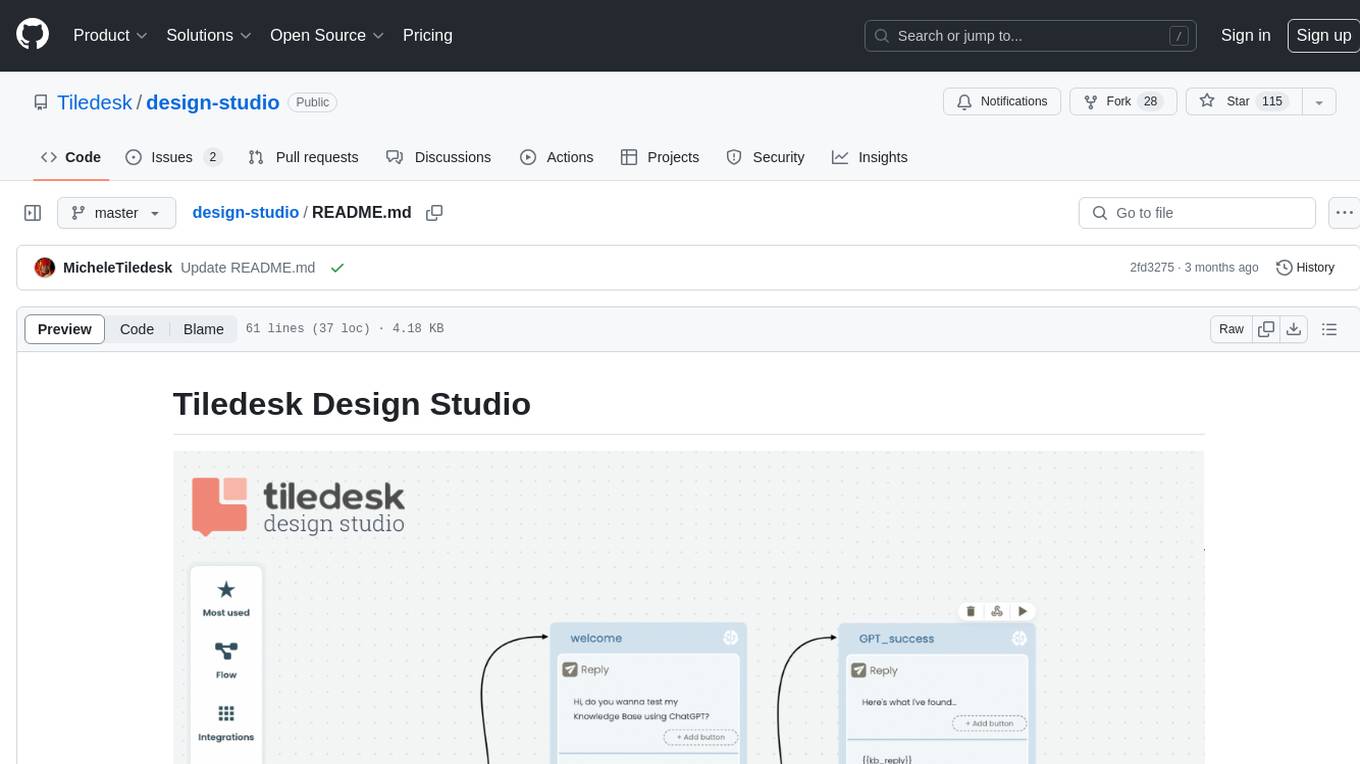
design-studio
Tiledesk Design Studio is an open-source, no-code development platform for creating chatbots and conversational apps. It offers a user-friendly, drag-and-drop interface with pre-ready actions and integrations. The platform combines the power of LLM/GPT AI with a flexible 'graph' approach for creating conversations and automations with ease. Users can automate customer conversations, prototype conversations, integrate ChatGPT, enhance user experience with multimedia, provide personalized product recommendations, set conditions, use random replies, connect to other tools like HubSpot CRM, integrate with WhatsApp, send emails, and seamlessly enhance existing setups.
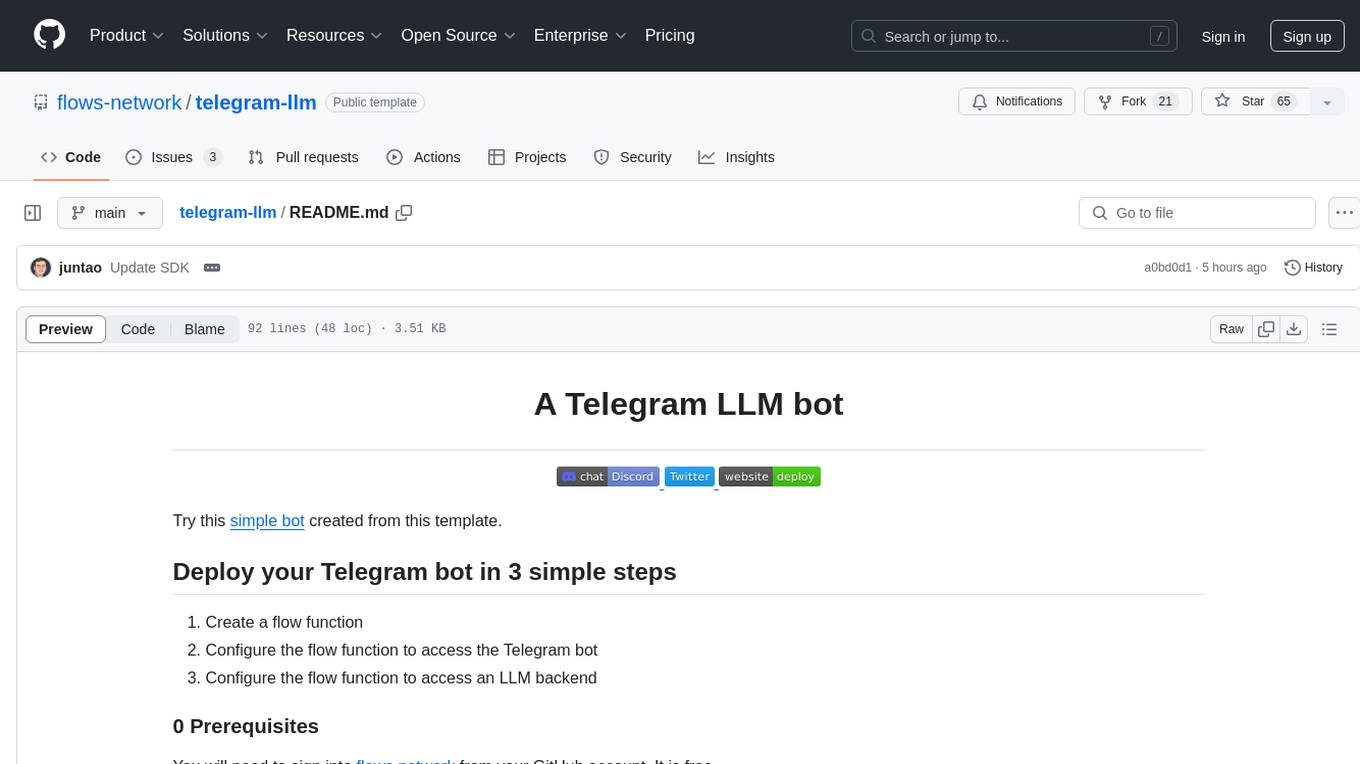
telegram-llm
A Telegram LLM bot that allows users to deploy their own Telegram bot in 3 simple steps by creating a flow function, configuring access to the Telegram bot, and connecting to an LLM backend. Users need to sign into flows.network, have a bot token from Telegram, and an OpenAI API key. The bot can be customized with ChatGPT prompts and integrated with OpenAI and Telegram for various functionalities.
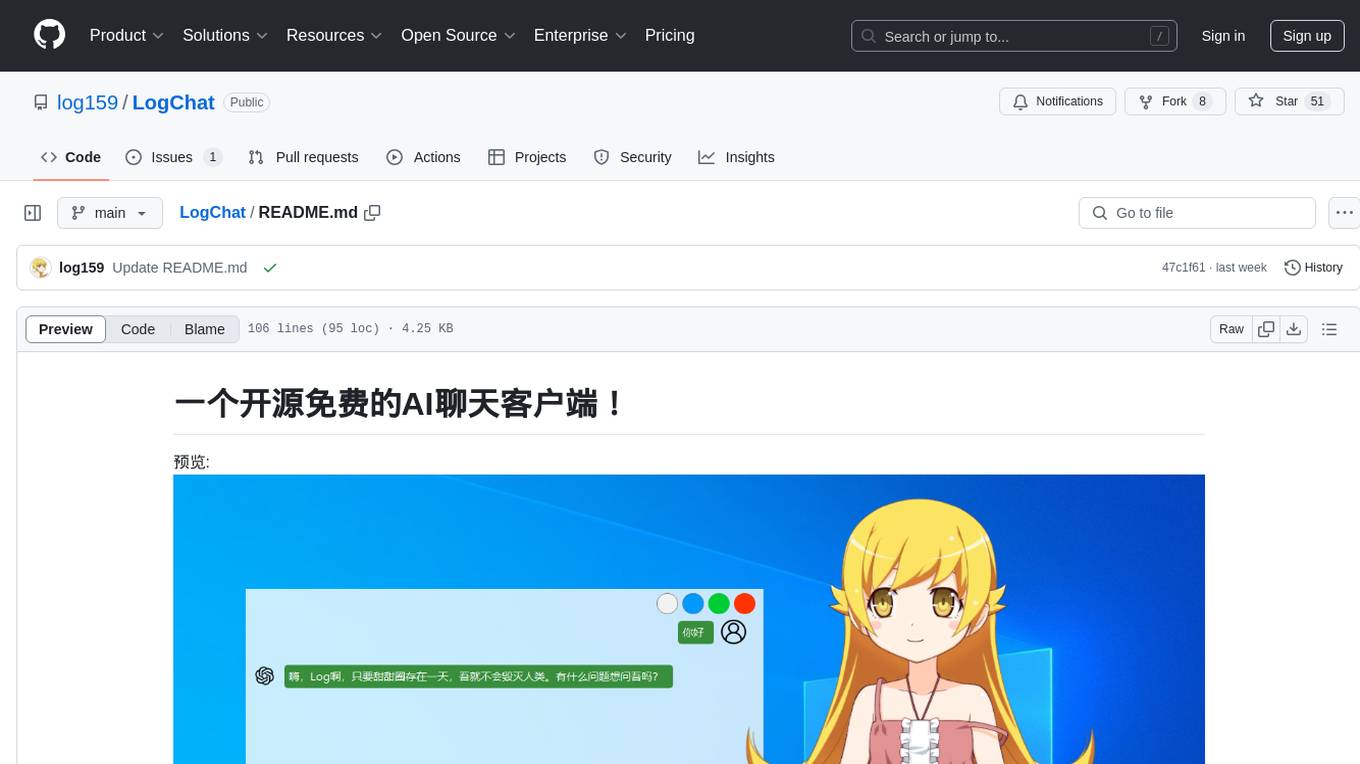
LogChat
LogChat is an open-source and free AI chat client that supports various chat models and technologies such as ChatGPT, 讯飞星火, DeepSeek, LLM, TTS, STT, and Live2D. The tool provides a user-friendly interface designed using Qt Creator and can be used on Windows systems without any additional environment requirements. Users can interact with different AI models, perform voice synthesis and recognition, and customize Live2D character models. LogChat also offers features like language translation, AI platform integration, and menu items like screenshot editing, clock, and application launcher.
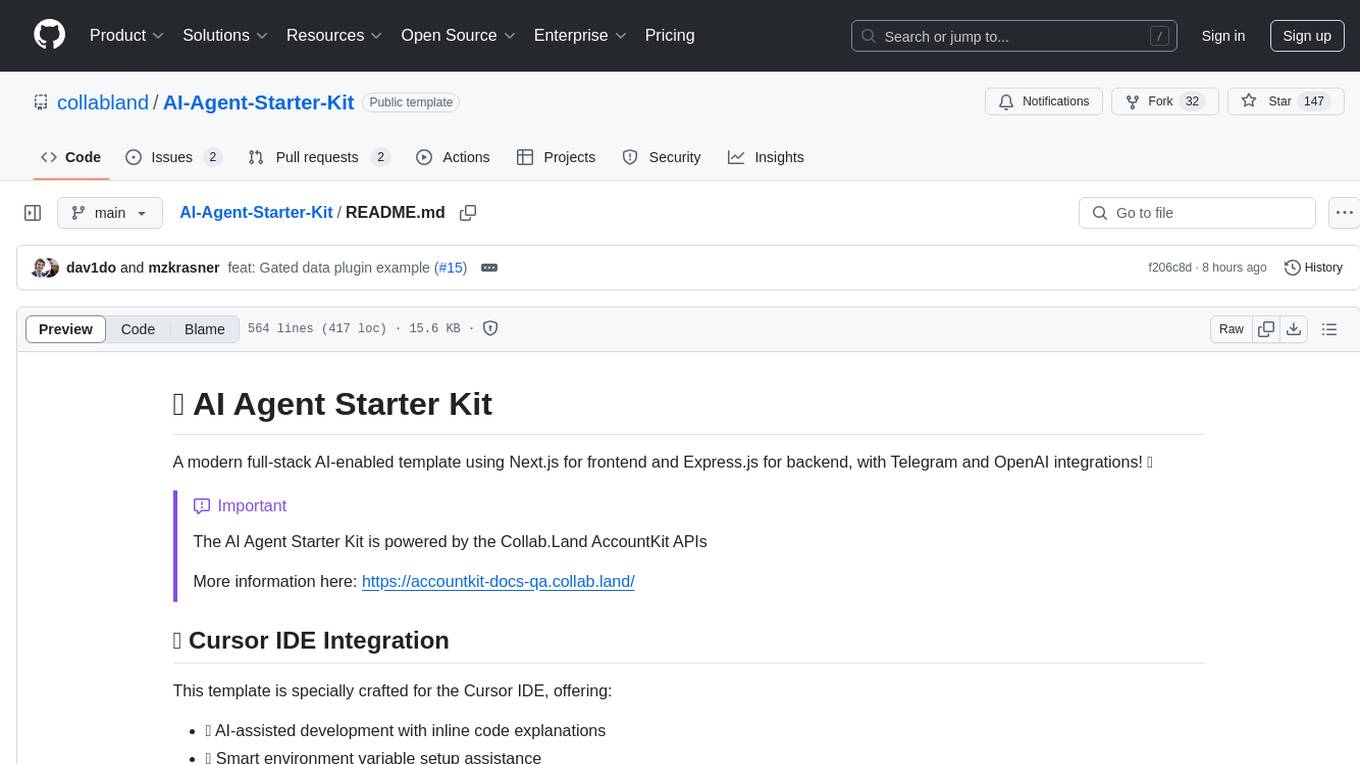
AI-Agent-Starter-Kit
AI Agent Starter Kit is a modern full-stack AI-enabled template using Next.js for frontend and Express.js for backend, with Telegram and OpenAI integrations. It offers AI-assisted development, smart environment variable setup assistance, intelligent error resolution, context-aware code completion, and built-in debugging helpers. The kit provides a structured environment for developers to interact with AI tools seamlessly, enhancing the development process and productivity.
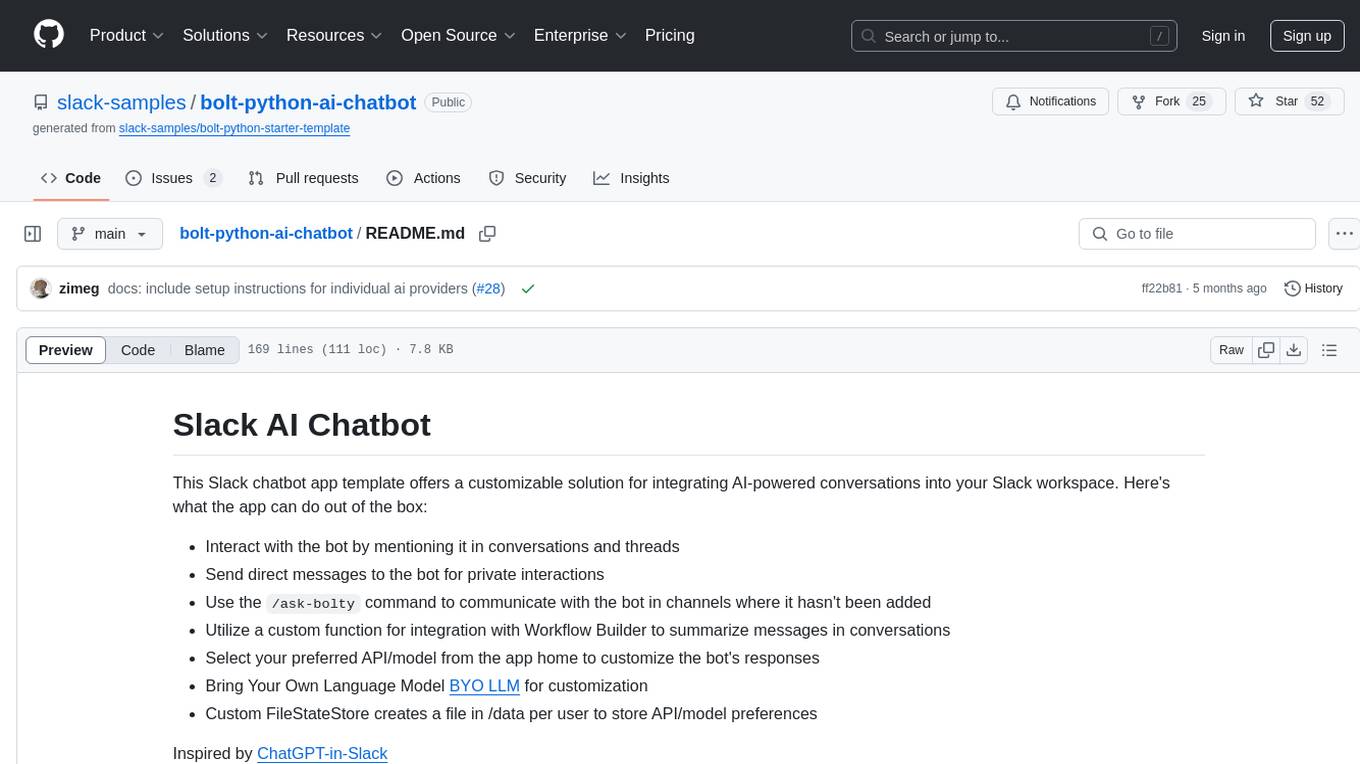
bolt-python-ai-chatbot
The 'bolt-python-ai-chatbot' is a Slack chatbot app template that allows users to integrate AI-powered conversations into their Slack workspace. Users can interact with the bot in conversations and threads, send direct messages for private interactions, use commands to communicate with the bot, customize bot responses, and store user preferences. The app supports integration with Workflow Builder, custom language models, and different AI providers like OpenAI, Anthropic, and Google Cloud Vertex AI. Users can create user objects, manage user states, and select from various AI models for communication.

MCPSpy
MCPSpy is a command-line tool leveraging eBPF technology to monitor Model Context Protocol (MCP) communication at the kernel level. It provides real-time visibility into JSON-RPC 2.0 messages exchanged between MCP clients and servers, supporting Stdio and HTTP transports. MCPSpy offers security analysis, debugging, performance monitoring, compliance assurance, and learning opportunities for understanding MCP communications. The tool consists of eBPF programs, an eBPF loader, an HTTP session manager, an MCP protocol parser, and output handlers for console display and JSONL output.
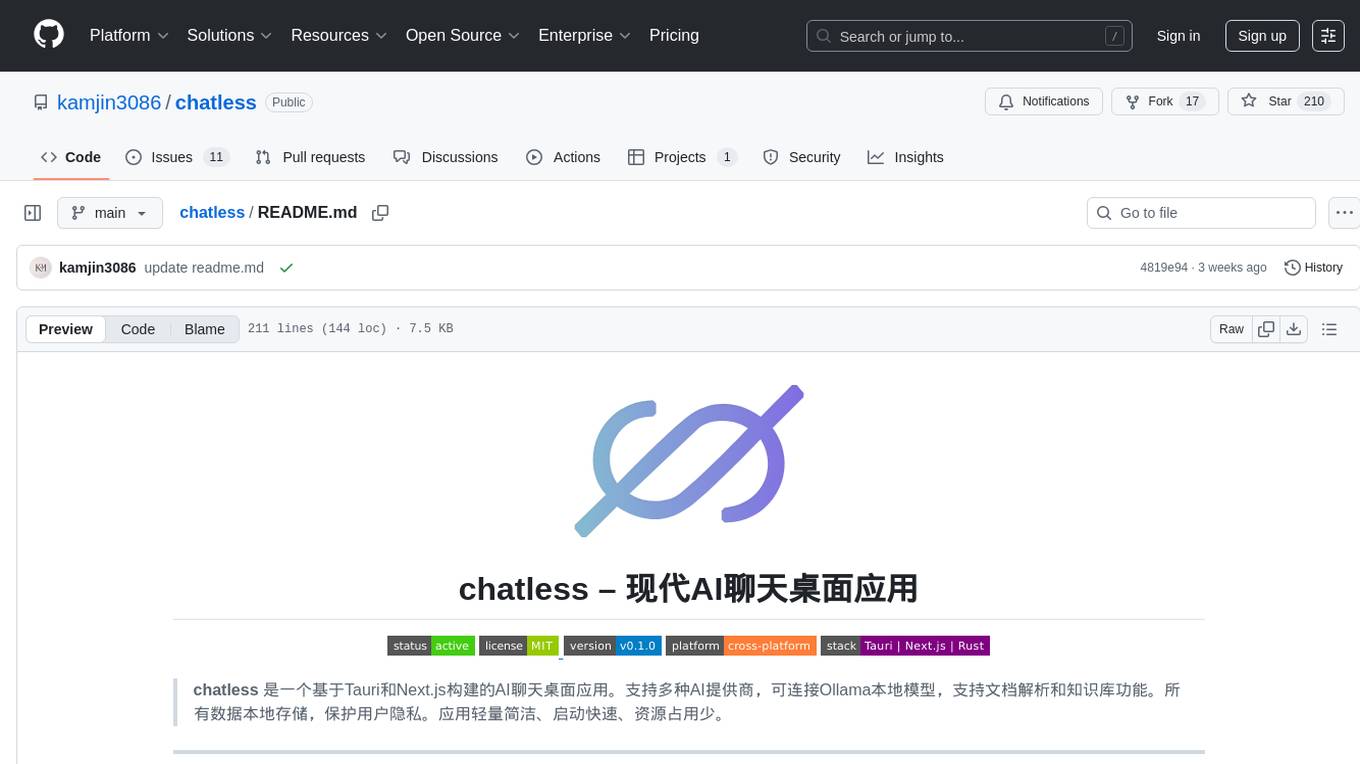
chatless
Chatless is a modern AI chat desktop application built on Tauri and Next.js. It supports multiple AI providers, can connect to local Ollama models, supports document parsing and knowledge base functions. All data is stored locally to protect user privacy. The application is lightweight, simple, starts quickly, and consumes minimal resources.
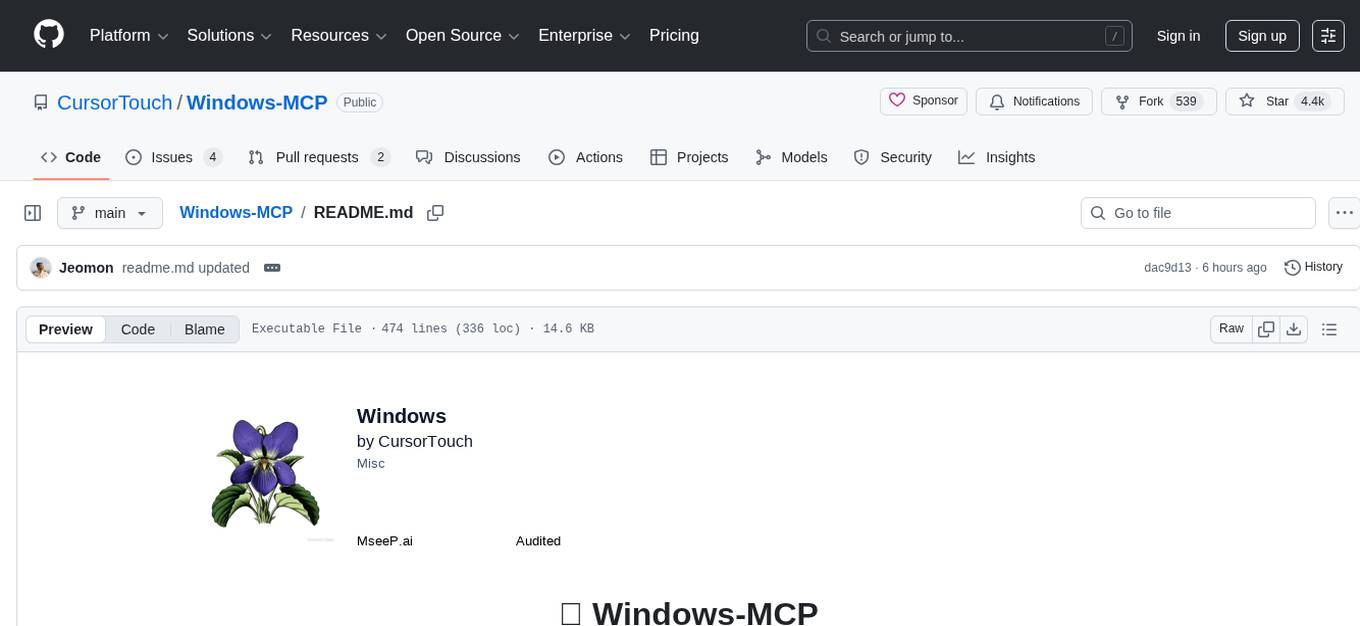
Windows-MCP
Windows-MCP is a lightweight, open-source project that enables seamless integration between AI agents and the Windows operating system. Acting as an MCP server bridges the gap between LLMs and the Windows operating system, allowing agents to perform tasks such as file navigation, application control, UI interaction, QA testing, and more. It provides seamless Windows integration, supports any LLM without traditional computer vision techniques, offers a rich toolset for UI automation, is lightweight and open-source, customizable and extendable, offers real-time interaction with low latency, includes a DOM mode for browser automation, and supports various tools for interacting with Windows applications and system components.


